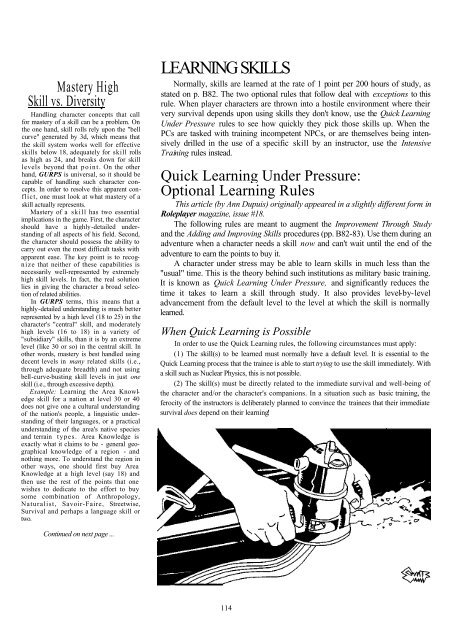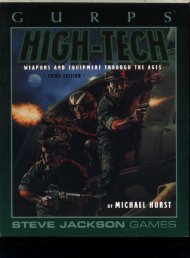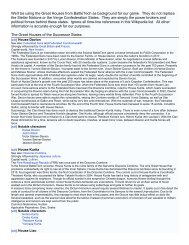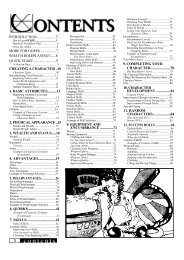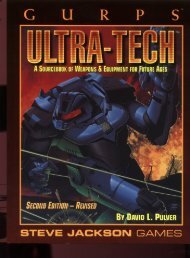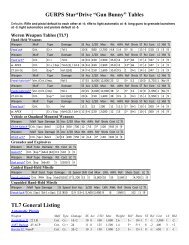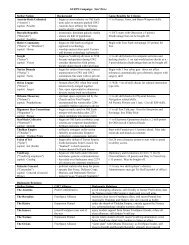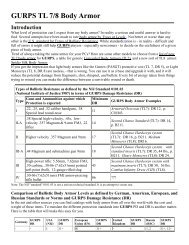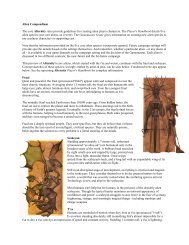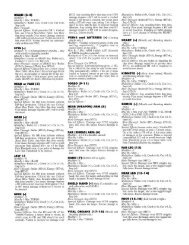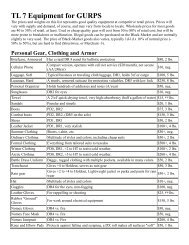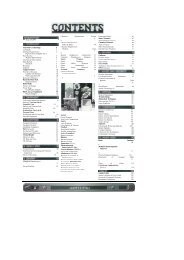GURPS - Compendium 1..
GURPS - Compendium 1..
GURPS - Compendium 1..
Create successful ePaper yourself
Turn your PDF publications into a flip-book with our unique Google optimized e-Paper software.
Mastery High<br />
Skill vs. Diversity<br />
Handling character concepts that call<br />
for mastery of a skill can be a problem. On<br />
the one hand, skill rolls rely upon the "bell<br />
curve" generated by 3d, which means that<br />
the skill system works well for effective<br />
skills below 18, adequately for skill rolls<br />
as high as 24, and breaks down for skill<br />
levels beyond that point. On the other<br />
hand, <strong>GURPS</strong> is universal, so it should be<br />
capable of handling such character concepts.<br />
In order to resolve this apparent conflict,<br />
one must look at what mastery of a<br />
skill actually represents.<br />
Mastery of a skill has two essential<br />
implications in the game. First, the character<br />
should have a highly-detailed understanding<br />
of all aspects of his field. Second,<br />
the character should possess the ability to<br />
carry out even the most difficult tasks with<br />
apparent ease. The key point is to recognize<br />
that neither of these capabilities is<br />
necessarily well-represented by extremely<br />
high skill levels. In fact, the real solution<br />
lies in giving the character a broad selection<br />
of related abilities.<br />
In <strong>GURPS</strong> terms, this means that a<br />
highly-detailed understanding is much better<br />
represented by a high level (18 to 25) in the<br />
character's "central" skill, and moderately<br />
high levels (16 to 18) in a variety of<br />
"subsidiary" skills, than it is by an extreme<br />
level (like 30 or so) in the central skill. In<br />
other words, mastery is best handled using<br />
decent levels in many related skills (i.e.,<br />
through adequate breadth) and not using<br />
bell-curve-busting skill levels in just one<br />
skill (i.e., through excessive depth).<br />
Example: Learning the Area Knowledge<br />
skill for a nation at level 30 or 40<br />
does not give one a cultural understanding<br />
of the nation's people, a linguistic understanding<br />
of their languages, or a practical<br />
understanding of the area's native species<br />
and terrain types. Area Knowledge is<br />
exactly what it claims to be - general geographical<br />
knowledge of a region - and<br />
nothing more. To understand the region in<br />
other ways, one should first buy Area<br />
Knowledge at a high level (say 18) and<br />
then use the rest of the points that one<br />
wishes to dedicate to the effort to buy<br />
some combination of Anthropology,<br />
Naturalist, Savoir-Faire, Streetwise,<br />
Survival and perhaps a language skill or<br />
two.<br />
LEARNING SKILLS<br />
Normally, skills are learned at the rate of 1 point per 200 hours of study, as<br />
stated on p. B82. The two optional rules that follow deal with exceptions to this<br />
rule. When player characters are thrown into a hostile environment where their<br />
very survival depends upon using skills they don't know, use the Quick Learning<br />
Under Pressure rules to see how quickly they pick those skills up. When the<br />
PCs are tasked with training incompetent NPCs, or are themselves being intensively<br />
drilled in the use of a specific skill by an instructor, use the Intensive<br />
Training rules instead.<br />
Quick Learning Under Pressure:<br />
Optional Learning Rules<br />
This article (by Ann Dupuis) originally appeared in a slightly different form in<br />
Roleplayer magazine, issue #18.<br />
The following rules are meant to augment the Improvement Through Study<br />
and the Adding and Improving Skills procedures (pp. B82-83). Use them during an<br />
adventure when a character needs a skill now and can't wait until the end of the<br />
adventure to earn the points to buy it.<br />
A character under stress may be able to learn skills in much less than the<br />
"usual" time. This is the theory behind such institutions as military basic training.<br />
It is known as Quick Learning Under Pressure, and significantly reduces the<br />
time it takes to learn a skill through study. It also provides level-by-level<br />
advancement from the default level to the level at which the skill is normally<br />
learned.<br />
When Quick Learning is Possible<br />
In order to use the Quick Learning rules, the following circumstances must apply:<br />
(1) The skill(s) to be learned must normally have a default level. It is essential to the<br />
Quick Learning process that the trainee is able to start trying to use the skill immediately. With<br />
a skill such as Nuclear Physics, this is not possible.<br />
(2) The skill(s) must be directly related to the immediate survival and well-being of<br />
the character and/or the character's companions. In a situation such as basic training, the<br />
ferocity of the instructors is deliberately planned to convince the trainees that their immediate<br />
survival does depend on their learning!<br />
Continued on next page ...<br />
114


